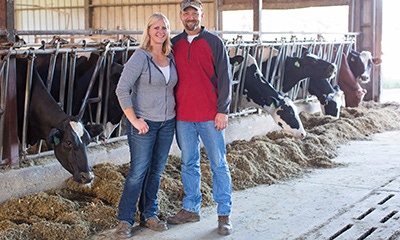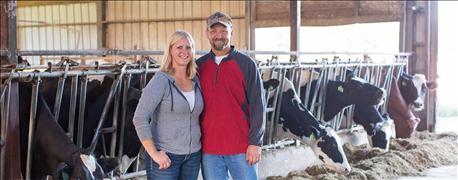May 25, 2016

The USDA Wisconsin Farm Service Agency welcomed a new executive director in April, Patty Edelburg. Edelburg is no stranger to Wisconsin FSA as she had served on the state FSA committee for six years when she was selected to lead the agency in April. The U.S. Secretary of Agriculture appoints state executive directors who then administrate FSA programs and staff in their state.

DOUBLE DUTY: New Wisconsin FSA Executive Director Patty Edelburg and her husband Gary milk130 registered Holsteins on their 350-acre farm near Scandinavia. Photo courtesy of Danae Bauer, Farmgirl Photography
Edelburg and her husband, Gary, farm near Scandinavia, where they milk 130 registered Holsteins on their 350-acre farm. She can easily identify with farmers engaged with FSA new and beginning farmer programs as the Edelburgs built their operation from the ground up. They bought a herd and rented a farm in 2003 then were able to purchase a farm in 2008. The Edelburgs have 15-year-old twins, Angie and Luke, who are finishing their freshman year at Amherst High School.
“Transitioning from serving on the state committee to now leading the agency provides Wisconsin FSA with a level of continuity as we are able to move forward in implementing and administrating the farm bill,” said Edelburg. “The biggest change for me has been more personnel management.” Wisconsin FSA has over 600 employees with the vast majority working at the county level.
Having spent 12 years on the Wisconsin Farmers Union board of directors, Edelburg advocated for some of the same farm policy that she will now implement as FSA state executive director.
“It’s been really interesting to be engaged in the policy side with Farmers Union and working to have legislation drafted on behalf of farmers,” said Edelburg, who has a bachelor's degree in animal science from University of Wisconsin-River Falls. “In my new role at Wisconsin FSA, we follow the laws that have been created and implement them. I’m seeing how effective the process can be from farmers engaging in the advocacy process to actually implementing programs. FSA is the face of the federal government at the county level.
“FSA Offices in the state are busy this spring,” said Edelburg. “Agriculture Risk Coverage and Price Loss Coverage sign ups have been taking place. With unfortunately low commodity prices, these programs can provide much needed value to producers. For those farmers who aren’t growing corn and soybeans, we have the Noninsured Crop Disaster Assistance Program, which covers crops not covered under ARC. On the dairy side, Margin Protection Program is going to benefit farmers in this lean time. Demand for enrolling acres in the Conservation Reserve Program was high this spring as we hit an enrollment cap.”
New and beginning farmer assistance programs will continue to be a priority for Wisconsin FSA. “We want more new and beginning producers to come into their county offices to learn about the programs available to them,” said Edelburg. “Another program that could be utilized more by farmers is the farm storage facility loan program. It provides farmers with the ability to capture low-interest loans to construct storage on the farm for grain, feed and cold storage needs.”
As a current farmer, Edelburg brings a unique perspective to her position.
“Having the ability to relate to our employees and producers is beneficial for me,” said Edelburg. “I understand what farmers need and where they are coming from. In my role at FSA, I see what the agency has the ability to offer. Most farmers don’t realize the programs and opportunities that we can provide them. If farmers have questions, I would encourage them to call their county office and ask. Something might be available to them that could be beneficial to their operation.”
You May Also Like




